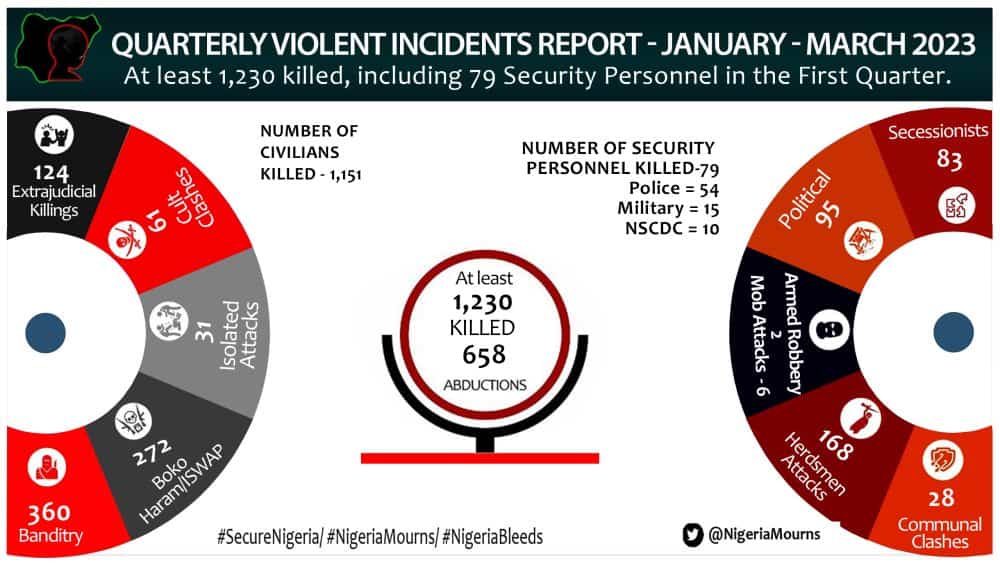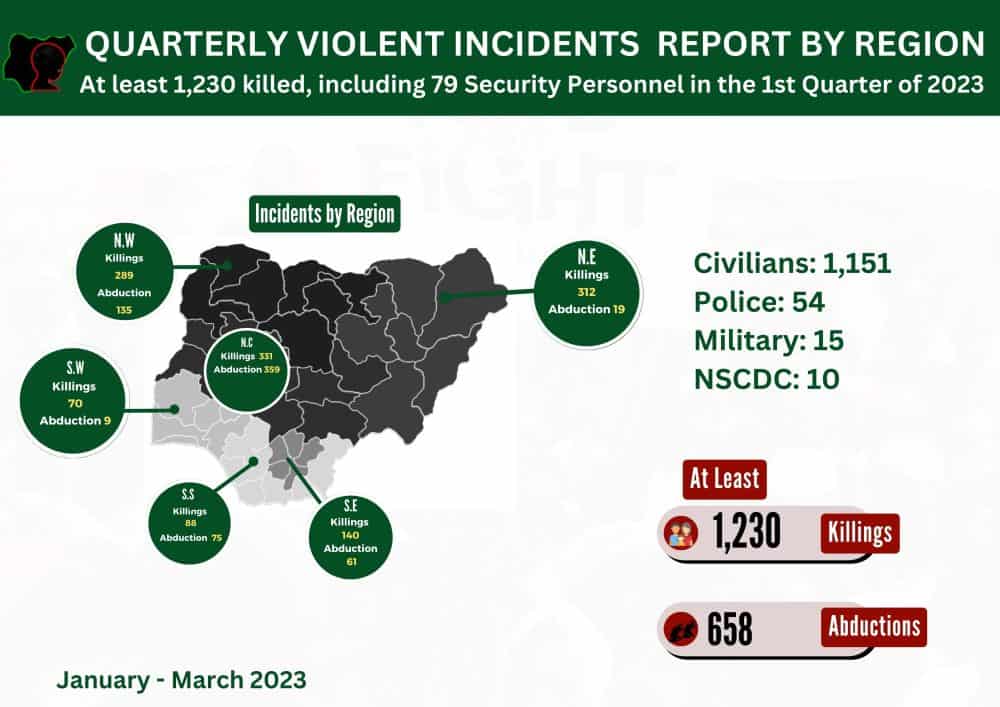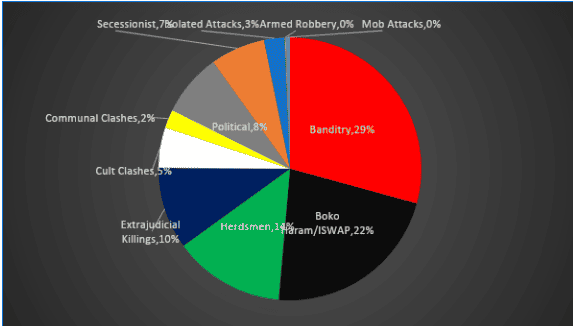1st QUARTER MASS ATROCITIES CASUALTIES TRACKING REPORT:
January – March 2023
Summary of Mass Atrocities Casualties for 1st Quarter 2023 (January – March)
In the first quarter of 2023, our data showed that at least 1230 people were killed including at least 79 security personnel and over 658 abductions took place across Nigeria. In what has been an unfortunate trend in our data collated in the first quarter of 2023, Banditry remains the largest cause of violent deaths across the country with 29.27% (360 deaths) while an existing threat is the rise in Extra-Judicial killings and Herdsmen related killings which constitute about 10.08% and 13.65% respectively with (at least 124 and 168 deaths each).
Boko-Haram/ISWAP-related atrocities constituted 22.11% (at least 272 deaths). Political killings mostly due to the recent 2023 National Election claimed at least 7.72% constituting (at least 95 deaths). Secessionists’ violent campaign mostly in the Southeast part of the country contributed 6.75% representing (at least 83 deaths) while Cult Clashes took 4.96% (at least 61 deaths). Isolated Attacks, Mob Attacks, Armed Robbery and Communal Clashes took the remaining 5.45% combined (at least 67 deaths).
This summary indicates an alarming increase in the activities of Boko-Haram/ISWAP in recent times, Extra-Judicial killings mostly perpetrated by security personnel and Herdsmen activities by mostly Fulani Herders.

The graphics above show the detailed disaggregation of violent incidents by different groups
Personnel Losses in Nigeria’s Fragile Security Framework
In the first quarter of 2023, 6.42% of all lives lost to violent killings were Security Personnel numbering at least 79 security operatives killed across Nigeria while the remaining 93.58% of lives lost violently are those of Civilians numbering at least 1151 deaths.
Data on the brazen killings of security operatives is further divided into para-military: Police (at least 54 deaths) constituting 68.35%, NSCDC (at least 10 deaths) representing 12.66% and Military (at least 15 deaths) accounting for 18.99%. With at least 54 lives lost, Police lives lost in the first quarter of 2023 constituted the highest losses among security operatives.
Regions Defined by Peculiarity of Violent Incidents
In examining the disaggregated data on violent incidents in the first quarter of 2023, our data confirm the popular opinion that each region of Nigeria is beguiled by a peculiar type of violent incident. While there was slight overlap in certain cases, overwhelming evidence from the data collated suggests that more often than not, violent deaths in a particular region can be attributed to the brand of violence associated with the region.
Overall, more violent incidents were recorded in the Northern part of the country than the South – of the at least 1230 deaths recorded, there were at least 932 violent killings in the North representing 75.77% of the total killed, in contrast to the South where at least 298 were killed representing 24.23% of the recorded figure. An in-depth breakdown of the data further reveals that Banditry and Boko-Haram/ISWAP are a form of terror up North that contributed the largest number of victims, with the North-Central suffering the heaviest number of casualties (at least 331 killed) due to mostly Herdsmen activities in Benue, Plateau and Nasarawa States. While the Northeast had at least 312 casualties, the Northwest had at least 289 casualties. In the South, however, a combined 140 deaths in the Southeast were attributed mostly to violent secessionist activities, South-South had at least 88 killed while at least 70 were recorded killed in the Southwest. A notable observation from data collated for the reporting period is that all reported civilian deaths were due to violent killings in the North-Central part of the country as a result of Herders’ violent activities.
Inversely, deaths due to secessionist activities were an exclusive feature of the South, particularly the Southeast where more than 90% of reported deaths were due to these nefarious activities. In a similar fashion, more lives were lost to Extra-Judicial killings by security personnel in both the South and the North. Of the at least 124 deaths due to Extra-Judicial killings, At least 56 were in Doma, Nasarawa State, with another 30 in Kutunku village, Wushishi LG, Niger State in the North-Central part of the country as a result of Nigerian Airforce shelling of suspected bandits’ location.
The infographic below presents a summary of civilian casualties due to violent killings by region for the 1st quarter of 2023:

Banditry and Boko-Haram/ISWAP: The Evolving Terror Front in Nigeria
Banditry and Boko-Haram/ISWAP remained Nigeria’s largest source of violent killings in the first quarter of 2023. The evolving security situation in the North is evidence of a failure in governance and a testament to the incompetence/inadequacy of our current security architecture. The gradual rise of this new wave of banditry in Northern Nigeria can be traced to a few years back when observers and researchers in the country started sounding the alarm on the rising level of bandit attacks in the North-West. At the time some reports from the North showed that banditry was deteriorating into a “complex national emergency” which could cause serious territorial problems, and they noted that the situation in the region (North-West) was reminiscent of the rise of the Boko Haram insurgency. At the time of these warnings, prominent organizations also proffered solutions and cogent recommendations to stem the tide of this new wave.
However, the failure of the authority and its security apparatus to effectively tackle the situation, coupled with government delayed decision to label the perpetrators as “Terrorist” for their violent conduct, a contextually impotent military approach, and government acquiescence to ransom demands (among other factors) emboldened the bandits, and encouraged the flourishing business of kidnapping for ransom in the North. From kidnappings and ransom demands, banditry has risen to become the premier cause of violent deaths across Nigeria while Boko-Haram/ISWAP continue to pose their own threat down North. The situation requires immediate attention and collaborative efforts from all stakeholders to restore peace and stability in the affected regions.

As evident from the diagram above, for the first 3 months of the year 2023, Bandits and Boko-Haram/ISWAP have killed more civilian than any other terror groups combined, making banditry the biggest threat to Nigerian lives in recent times and as previously reported (and 2022 generally as our data over the course of the months have shown). While they may not operate as a united front or in the typical manner that violent extremist groups do, the facts prove that banditry is Nigeria’s new face of terror.
Conclusion and Recommendations:
Generally, there was a reduction in the number of lives lost to violent killings and abduction for ransom in the first quarter of 2023 compared to what was recorded in the previous years.
Additionally, the continued loss of lives of security personnel constitutes a present and consistent threat to the general security of Nigerians, security personnel in Nigeria have faced significant challenges and dangers in recent years, with reports of attacks by armed groups and criminal organizations. It is important to note that violence and conflict can have severe and long-lasting consequences for individuals, families, communities, and entire nations. It’s crucial to work towards finding peaceful and sustainable solutions to these issues, while also prioritizing the safety and security of all people involved.
The government must strengthen security measures, improve intelligence gathering, and work with the security forces to bring the perpetrators to justice. Identifying and tackling the root causes of these atrocities, such as poverty, unemployment, and political instability, is crucial to prevent their recurrence.
Moreover, the media and civil society should highlight these incidents and put pressure on the government to take action. It’s also essential to promote dialogue and peaceful coexistence among different ethnic and religious groups in Nigeria.


